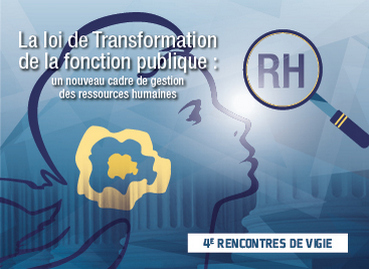|
If you are having trouble viewing this email, open it with your internet browser,
download the PDF version
or contact us.
|
 |
| #18 - October 2019 |
| PDF version - Manage your subscription - Search - Archives |

|
|
vision RH is a newsletter published by the French Directorate General for Administration and the Civil Service (DGAFP). It draws on information sources and reports issued by public administrations, the private sector, international organisations and the press, in several different languages. It aims to provide a broad view of current human resources and civil service initiatives.
|
|

|

|
| Changing and adapting public-sector HR management | |||||
|
The Civil Service Transformation Act, which was promulgated on August 6, changes the HR management framework by adapting it to new challenges faced by the French administration. Outside of France's borders, other countries have also reformed public-sector employment and implemented provisions that directly affect employees' daily lives. In labour-management dialogue, there is an obvious trend towards the development of "social councils" at local level, similar to the prevailing model in the private sphere, as has been the case for many years in Germany (Personalräte) and Sweden (personalutskotten). Council members are elected by employees and are mandated to negotiate with management concerning all issues of a basically collective nature. On the other hand, at national level, the representative trade unions always bargain with public employers. These negotiations then take the form of collective bargaining agreements that may be category- or sector-specific, as well as other types of agreements, some recent examples of which include: • In Spain, the introduction of a variable component to pay rises that is pegged to economic growth • In Norway, the active participation of public employees in defining the processes that will support the rollout of digital services • In the Netherlands: the conversion of part of staff compensation into an individualised credit that can be freely converted into leave, training or retirement savings Even though national circumstances (historical, cultural or economic) differ, we note that most administrations are seeking to adopt a more flexible recruitment policy in response to changing needs. To make this possible, managers must also be given greater autonomy. We can cite the following examples: • Germany offers employment contracts to individuals with the appropriate professional experience and qualifications, and now takes that experience into account in the form of a length-of-service allowance, and even provides special allowances for certain professions experiencing recruitment difficulties • Ireland introduced the fixed-term, specified-purpose employment contract, which was the inspiration behind one of the measures in the new French legal framework. This type of contract is attracting applicants and will be the subject of an initial assessment • The United States set up the Hiring Managers portal. It is intended for managers and consists of assistants that help with job descriptions, candidate selection and workforce planning. To support inter-departmental mobility, but also mobility outside the public sector, some countries have rolled out scalable systems to ensure career safety while promoting civil service appeal: • As part of nationwide adjustments to the federal workforce, Canada provides employees with transition assessments and funding for diploma courses, as well as access to a job exchange programme, including in the private sector • Denmark is currently relocating some government departments in its regions. Guidelines have been issued on how to reorganise departments (increased use of teleworking, recognition of travel time and housing subsidies) Some countries, such as Australia (Opening up the APS), the UK (WIG Exchange) and, more recently, Slovenia (Partnership for Change), are strongly encouraging senior managers to take up positions in the industrial and commercial sectors at regular points during their careers. |
|||||
|
|||||
|
|
|||||

|
|||||

|

|

|
| Cyprus's civil service reform initiative | |||||
|
The Cyprian government presented a new reform project, whose three main points involve overhauling the appraisal system, which will be exclusively objectives-based, eliminating seniority as a criterion for being offered promotions, and systematically making all vacant positions available to all civil servants to help diversify career paths. |
|||||
|
|||||
|
|
|||||

|
|||||
| Report on the implementation of the EU's Staff Regulations | |||||
|
Five years after the entry into force of the latest revision of the Staff Regulations of Officials, the European Court of Auditors has published a report on its implementation. It concludes that, despite greater diversification and flexibility of staff, the impact on improving HR management is rather limited. According to the Court, the changes have even had negative repercussions in terms of making the EU's civil service appealing. |
|||||
|
|||||
|
|
|||||

|
|||||
| The Dutch government's "employer brand" platform | |||||
|
As part of the public job board "werkvoornederland" (Working for the Netherlands), a new website presents the various public-sphere professions, but also the advantages of working for the Dutch government. The emphasis is placed on compensation, work flexibility and opportunities for career development. The combination of these three elements is the primary motivation for Dutch applicants. « By providing the conditions for you to continue to evolve, the state wants to be first and foremost a responsible employer »
|
|||||
|
|||||
|
|
|||||

|
|||||

|

|
| A new automated applicant tracking system for the British Civil Service | |||||
| "vX" is a new tool used by the Government Recruitment Service (GRS), which delivers around two-thirds of the recruitment across the Civil Service. vX has been designed to automate the entire recruitment process, from online application to final hiring, and to optimise data entry. Each participant – including the applicant – can, depending on his or her profile, consult the progress of the application in real time. | |||||
|
|||||
|
|
|||||

|
|||||
| HR partnership programme for the Finnish government | |||||
|
HAUS, Finland's national training institute, has set up a partnership programme for deploying the management framework as defined by the government's HR service (Valtiokonttori). By signing agreements, government departments are assigned experts trained in change management to help them transform their HR services and contribute to their repositioning within organisations. |
|||||
|
|||||
|
|
|||||

|
|||||
| Reclassification agreement for Spanish military personnel | |||||
|
In response to the increasing number of military personnel who must leave the armed and naval forces because they have reached the mandatory retirement age of 45, the Ministry of Defence has signed an integration agreement with the Federation of Municipalities and Provinces. Under its terms, 20% of positions offered, mainly in municipal police forces and some autonomous communities, will be reserved for ex-military personnel. « The ministry will work to promote this conversion and to prepare the agents by adapted specific training. adaptée »
|
|||||
|
|||||
|
|
|||||

|
|||||

|

|
| Transition management, a priority for Swiss federal staff | |||||
|
As part of its new HR strategy, the Swiss federal administration is committed to remaining an appealing employer, able to meet its employees' needs during the various phases of their careers. To this end, it has developed a model for managing employees' pre-retirement years. Two measures, namely the prospective interview and the adapted career, should be offered to any staff member who has reached the age of 58. |
|||||
|
|||||
|
|
|||||

|
|||||
| Reintroduction of a collective agreement for Italian public-sector leaders | |||||
|
After ten years of waiting for one, public-sector leaders who are not civil servants (the majority in Italy) can now benefit from a new collective bargaining agreement negotiated by ARAN, the agency representing public sector employers. In addition to a salary increase, it provides for enhanced social protection. An allowance is introduced in the event of restructuring, conditioned on a positive performance appraisal. |
|||||
|
|||||
|
|
|||||

|
|||||
| A "marketplace" for managing Personal Training Accounts | |||||
|
Designed by the Caisse des Dépôts, a new application linked to employees' Personal Training Accounts (CPF) will be launched in early December. As with the existing commercial platforms, each user will have access to their entire training history. They will be able to search and register for trainings, and evaluate them once completed - which triggers payment. A specific algorithm will guarantee that training offers are objectively ranked. « In the field of public services, this is a first. We built a market place - a bit like an Airbnb or Booking of vocational training »
|
|||||
|
|||||
|
|
|||||

|
|||||

|

|
| Work flexibility: daily life in a German federal office | |||||
|
For almost twenty years, Germany's Federal Office of Administration (Bundesverwaltungsamt), a public institution under the supervision of the Ministry of the Interior, which provides a range of internal and external services and employs 4,800 people at 7 sites, has been a trailblazer in flexible working time. The Office presented an assessment of its "FAZIT" (Flexibile Working Time in the Team) scheme, which has the highest employee satisfaction rate, now at 98%. |
|||||
|
|||||
|
|
|||||

|
|||||
| "Nothing without us": an accessibility strategy for the Public Service of Canada | |||||
|
Enabling everyone to work in Canada's public service is the clearly stated objective of the federal government. A five-point strategy has been introduced to create conditions for identifying, preventing and removing barriers to the participation of individuals with disabilities. This follows extensive consultation by the Treasury Board Secretariat (TBS), which then resubmitted its proposals before finalising them. |
|||||
|
|||||
|
|
|||||

|
|||||
| Assessment of a pre-mediation trial phase in the Local Civil Service | |||||
|
Compulsory pre-mediation is being tested in 42 management centres (centres de gestion) with good results. The idea is to instill a communication process to resolve disagreements concerning individual administrative decisions made by the employer. After a year-long test phase, the system appears to be particularly relevant in the view of mediators, since it gradually introduces a culture of shared solution-finding. « Mediation helps to better analyze the situation and understand the issues of the other part, which makes solution easier to reach »
|
|||||
|
|||||
|
|
|||||

|
|||||

|

|
| 3S: the new teleworking arrangement at Renault | |||||
|
Teleworking is winning over more and more people each year, and the new scheme put in place at one of France's major car manufacturers is making it an even more attractive option. Under the new arrangement, known as "3S" ("Simple, Souple et Sécurisée", or "Simple, Flexible and Secure"), employees may telework according to a pre-determined or flexible schedule, and may work half or full days. The agreement was signed in February 2019 with employee representatives, and is subject to conditions of eligibility. Employees can opt for fixed days (from a half day up to 2 days per week), occasional teleworking days or a combination of the two (providing they do not exceed 2 teleworking days per week). To maintain social cohesion, the agreement provides that each manager may, in conjunction with her or his staff, define up to two so-called "team days" per week, on which all teleworkers must be physically present. Even though the goal is not for teleworking to be a means to optimise workspaces, Renault is also committed to rethinking and developing shared spaces. |
|||||
|
|||||
|
|
|||||

|
|||||

|

|
| An HR skill centre for the Luxembourg Civil service | |||||
|
To cope with new challenges – such as making the public sphere more appealing, implementing reforms and professionalisation – the Grand Duchy's civil service has launched a major modernisation project. Under the Act promulgated in July 2018, the State Centre for Human Resources and Organisation Management (CGPO) was set up. As the successor to the State Personnel Administration and with an expanded remit, the Centre manages the entire career cycle for public employees, who can be divided into civil servants and employees. The Centre coordinates a wide range of projects, ranging from adapting new reclassification procedures within the IT system to the design of an employee website (MyRH) based on the "digital by default" initiative, as well as the development of an EDM system shared with the Ministry and the National Institute for Public Administration (INAP). Following a "Recruitment Refit" audit, which brought to light certain limitations in the candidate selection process, the CGPO was asked to redesign the competitive examination on the basis of an online model, focusing on assessing aptitude and skills, while at the same time reducing waiting-times. Initial results indicate a higher success rate. .
On the strength of its expertise, the CGPO has also set up an HR skills centre, whose remit is to offer tools and to provide support and supervision service to managing departments. This offer is in response to mounting requests for one-off assistance and training from government departments. The Ministry of the Civil Service and the CGPO have established a network of HR stakeholders and practitioners with which they meet on a regular basis to present and discuss local innovations. In this same vein, several thematic HR communities of practice have been set up to breathe life into this system. At the end of November 2018, in recognition of the quality of its work, the Centre was awarded the "HR Digital Transformation Award" for its efforts within the context of HR digital transformation projects. |
|||||
|
|||||
|
|
|||||

|
|||||

|
|
Share
|
||||
|
||||
| SUBSCRIBE - UPDATE YOUR SUBSCRIPTION - ARCHIVES - RSS - UNSUBSCRIBE |
|
French Directorate-General for Administration and the Civil Service (DGAFP)
Publication Manager: Thierry LE GOFF Managing Editor: Xavier MAIRE Editor-in-chief and Autor: Jean-François ADRIAN Layout and graphic design: Jean-François ADRIAN and Aphania. The texts of the publication do not reflect the point of view of the DGAFP
In accordance to the French Act n°78-17 of 6 January 1978 on information technology, data files and civil liberties and to the european General Data Protection Regulation (GDPR), your personal data is stored securely and you are entitled to access, correct and delete them. To do so, you should send an e-mail to (contact-visionrh@kiosque.bercy.gouv.fr) or write to DGAFP: 139, rue de Bercy - 75012 Paris; France.
Reproduction is authorized with mention of the source © DGAFP 2019 / N° ISSN: 2606-7528. |
|
|





